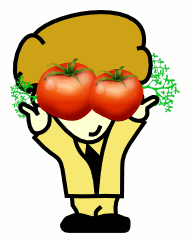Wednesday, May 14th 2008
Tomatoes on the eyes or beans in the ears ?
(These are two German expressions which mean " to be blind, to not see the obvious" and "to be deaf, not to listen".)
 In november 2007 I handed in my thesis entitled
"Positive or Negative? About The Aspect of Valuation in German and French Culinarisms" at the University of Leipzig. It's a linguistic study within the sphere of phraseology.
In november 2007 I handed in my thesis entitled
"Positive or Negative? About The Aspect of Valuation in German and French Culinarisms" at the University of Leipzig. It's a linguistic study within the sphere of phraseology.
The central issue discussed is whether or not food is respresented in a more positive way in French idioms than in German ones. According to popular belief, food and meals play a more important role in the lives of the French, while Germans supposedly spend less time and money on a good meal.
In a broadcast on German radio, hosted by Italian author and translator Daniele Dell'Agli, a caller went as far as to accuse German eating habits of "barbarism". Dell'Agli later put forward his polulistic thesis that this negative attitude towards food is reflected in German idioms. Indeed, expressions such as "Alles Käse!" ("It's All cheese!", meaning "it's all rubbish, it has gone pear-shaped"), "aus jemandem Hackfleisch machen ("to make mincemeat out of someone") or "jemandenen ausnehmen wie eine Weihnachtsgans" ("to disembowel someone like a Christmas goose", meaning "to take someone to the cleaner's") seem to support his point. But is this really so much of a difference to the French tongue? And does it actually degrade food as such?
With the aid of a corpus-based analysis I thouroughly explored this question and was able to proclaim an, in it's clarity, surprising yet not wholly unexpected result: No! For reasons of geographical as well as cultural-historical proximity both languages show more common than diverging features concerning culinarisms. Conclusion: Over-simplification and generalization are rarely ever a smart approach to national specifities of any kind, as they tend to stray very far indeed from reality.
If this introduction has made you curious, you may access my paper (in German) below.
| - Thesis |  |
 |
| - Introduction Corpus |  |
 |
| - French Corpus |  |
 |
| - German Corpus |  |
 |
